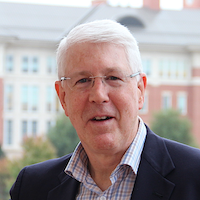This article was published originally on the UNC Gillings School of Global Public Health on September 13, 2019.
Above all else, researchers must be patient.
Stephen Hursting, PhD, professor of nutrition at the UNC Gillings School of Global Public Health and UNC’s Nutrition Research Institute, knows this to be true.
He joined the Gillings School faculty in 2014, but has been researching ways to prevent cancer for decades. Also a member of the UNC Lineberger Comprehensive Cancer Center, he studies the links between obesity and cancer, trying to find a solution for the increased risk obesity can cause.
“Our work has evolved from asking Is obesity increasing cancer risk? and What are the mechanisms linking obesity and cancer?” he says. “We have largely answered the first question and are still working on the second, but our focus really has turned to What are we going to do about it?”
Happily, Hursting has ongoing support from the Breast Cancer Research Foundation (BCRF). With a ~$250,000 award running October 1, 2019, through September 30, 2020, he will launch a research project titled, “Combining Intermittent Energy Restriction and Anti-Inflammatory Regimens to Mimic the Anticancer Effects of Bariatric Surgery.”
“Thanks to previous BCRF funding, we were able to establish that sleeve gastrectomy — the most common form of weight loss surgery in the United States — reverses many of the metabolic, inflammatory and pro-cancer effects of obesity,” Hursting says. “In the current grant, we are testing whether a 5:2 diet regimen (5 days/week of a healthy diet; 2 days/week of a low-carbohydrate/low-calorie diet), when combined with an aspirin-like anti-inflammatory drug, can exert the metabolic and inflammatory reprogramming and anti-cancer effects of the bariatric surgery without doing the surgery. We also are working to establish the role of the microbiome in these effects.”
The current award from BCRF marks the sixteenth year the organization has funded Hursting in some capacity.
“We are so appreciative of the support from BCRF and the many opportunities it has provided over the years,” Hursting says. “For example, the early funding stimulated the development of several important breast cancer models and assay systems for studying the obesity-cancer link that many in the field are now using. More recently, the funding and networking through the annual BCRF grantees symposium has stimulated fruitful collaborations with translational investigators who bridge our laboratory studies with clinical trials in obese women at high risk for breast cancer.”
“Dr. Hursting is not only an eminent scholar, but also an amazing citizen in the community of cancer researchers and of our School,” adds Elizabeth Mayer-Davis, PhD, Cary C. Boshamer Distinguished Professor of Nutrition and Medicine and chair of the Gillings School’s nutrition department. “His accomplishments in research are tremendous. Still, he has found an enormous reserve of time to facilitate the translation of his work into public health recommendations, and to nurture many, many students who will be our future leaders.”
Contact the Gillings School of Global Public Health communications team at sphcomm@unc.edu.
Posted: September 17, 2019

